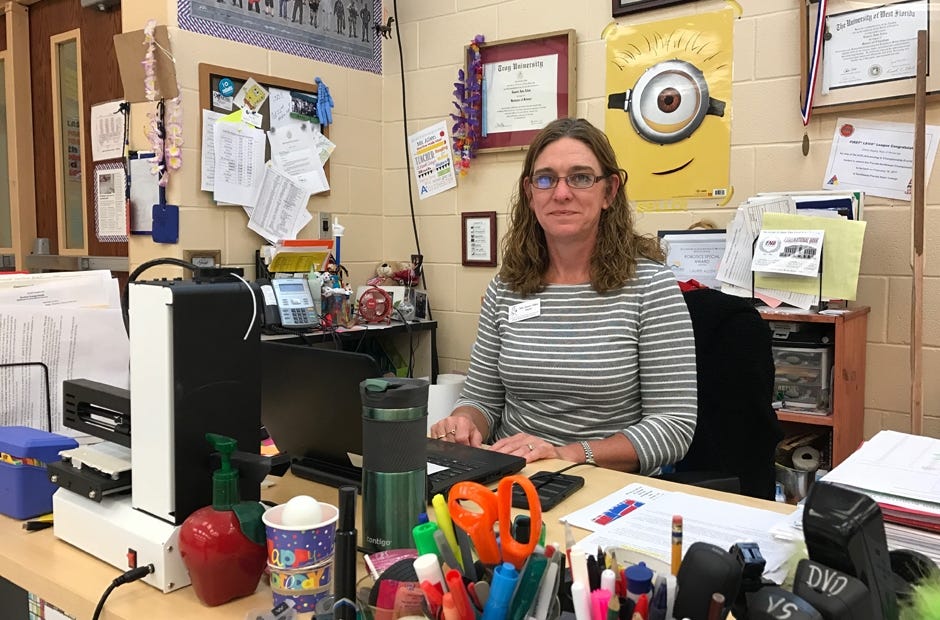![Laurie Allen of Shoal River Middle School will teach the first pure robotics program at an Okaloosa County middle school. [MARK JUDSON/NEWS BULLETIN]](http://127.0.0.1/wordpress/wp-content/uploads/2022/01/ghows-DA-4b67f709-b204-0f47-e053-0100007f6fa6-aed17af9.jpeg)
CRESTVIEW—Laurie Allen’s tech lab at Shoal River Middle School looks more like a teenager’s bedroom than a traditional classroom.
Hydraulic robots, 3-D printers, bottle rockets and Lego pieces are scattered in every corner — and it’s all part of the curriculum.
Allen coaches the school’s robotics team but, since its inception eight years ago, it has always been an extracurricular activity.
That’s all about to change with approval for her to teach a class on robotics.
“It’ll be a research-based course but draws in a number of science, engineering and communication skills as well,” Allen said.
Students at any of the middle school’s grade levels can apply for the course but they must commit to be on Allen’s robotics team.
The team constructs functioning machines using Lego Mindstorms, a more complex version of the toy bricks most people know. Movements and actions are conducted by programming a “brick” using a Lego-specific program language similar to the standard language C++, which computer engineers and programmers use.
Allen’s course will be the first middle-school level robotics class offered in Okaloosa County, but she’s not the only one integrating the field into the classroom.
CRESTVIEW ROBOTICS
Several district schools compete in robotic competitions for different leagues. The FIRST Lego League, FIRST Tech Challenge and FIRST Robotics Competition are available for teams to participate in, depending on their grade level, and each increase in complexity.
Teams can qualify for regional, state, national and even worldwide competitions through the FIRST leagues.
Shoal River Middle School, Davidson Middle School and Bob Sikes Elementary all have competitive robotics teams and integrate those skills into coursework.
Tim Sexton, a robotics coach and STEM instructor at Davidson Middle School, allows students to construct robots and similar tools as part of his technology courses.
Allen, too, allows robotics-inclined students to apply those skills for other STEM electives. Currently, robotics students program and construct while other students work on different projects — during the same class period.
“It’s organized chaos,” Allen said with a laugh.
Her robotics class will cap at 24 students; she already has eight applications, even though they aren’t due for several weeks.
A COLLEGE ALTERNATIVE
“We want to explore careers for kids that aren’t going to college,” Allen said. Through her class and other technical courses taught in Okaloosa County, students can receive industry-level certifications. These can be used to land careers in the tech field.
Sexton expressed a similar sentiment to a room of parents during an event in February.
Hearing a child might not go to college, or might not want to, isn’t the most common conversation for a teacher to have, but Sexton and Allen agree it’s a reality and, therefore, children need to be prepared for success even without a degree.
“I haven’t really had much pushback when I tell parents that,” Allen said. “I think they understand and the fact we are offering [students] real-world certifications helps parents realize we’re committed to helping every student, regardless of what they do.”
Technical certifications can also help students that do pursue a collegiate path and provide them a skills foundation to succeed in higher-level classrooms, according to Allen.
OKALOOSA ROBOTICS’ FUTURE
“Educational leaders recognize the necessity for drawing kids to the [science, technology, engineering and mathematics] fields of study,” Ben Shuman said. He’s taught several STEM courses at Niceville High School and now oversees technology education programs in Okaloosa County.
Shuman has two primary goals for robotics programs in Okaloosa County.
“First, our desire is to have a competitive robotics team at every school across the Emerald Coast in the next three to five years,” Shuman said. “Competitive robotics is a beautiful way to offer [students] an application for skills learned through STEM education.”
Second, Shuman wants to see robotics integrated into “anything” taught in schools. He believes robots can be used as a teaching tool in any classroom, not just STEM-related courses, and will enrich the learning experience.
HOW IT’S FUNDED
The Lego Mindstorm EV3, which is the standard robotics kit, costs about $350. Add the cost for programming software, 3-D printers, the plastic used for the printing, extra Legos, traveling to regional and state competitions and running a STEM class can be costly.
“There’s a bunch of grants out there for STEM programs,” Shuman said. Sexton and Allen have applied for and received some of these grants but they have to complete applications themselves.
Grants from individuals like Paul Hsu, a tech entrepreneur and businessperson, also help area programs, according to Shuman. Hsu’s foundation awards about $13,000 annually to Crestview area STEM teachers.
The Okaloosa County School District has also been supportive of STEM initiatives, according to Allen, Sexton and Shuman.
The district is attempting to secure about $300 million from Triumph Gulf Coast to put toward STEM curriculums at all grade levels, according to OCSD Director of Community Affairs Henry Kelley.
Triumph Gulf Coast will provide $1.5 billion in punitive relief to eight counties affected by the BP oil spill of 2010. The money must be used for education, infrastructure or “game-changing projects,” Kelley said.
If awarded, OCSD doesn’t expect to see the money until the fall, meaning any curriculum growth wouldn’t occur until the 2018-19 school year, according to Kelley.
In the meantime, schools are offsetting costs through business partnerships and fundraising.
Shoal River Middle School will host an obstacle challenge April 1 to raise money for the school’s robotics program.
Visit www.okaloosaschools.com/shoalriver/ for registration and event information.




This article originally appeared on Crestview News Bulletin: County launches first middle-school robotics class
